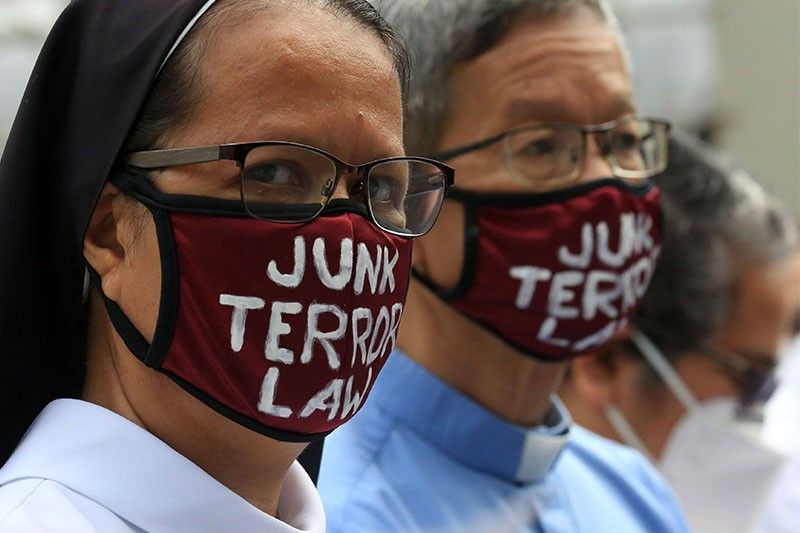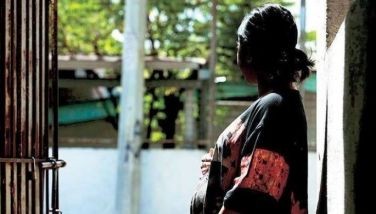Religious groups join legal fight vs anti-terrorism law at SC

MANILA, Philippines — Church leaders on Friday joined the growing number of legal challenges against the much-feared anti-terrorism law before the Supreme Court.
Led by Manila Auxiliary and apostolic administrator of the Archdiocese of Manila Broderick Pabillo, 20 religious leaders filed the 18th Petition for Certiorari and Prohibition against Republic Act 11479 or the Anti-Terrorism Act of 2020.
RELATED: Manila bishop gets COVID-19
They asked the SC to issue a temporary restraining order to prohibit the government-respondents from implementing the law, which the Palace asserted took effect on March 19.
Even before they formalized their opposition to the law with this petition, the Catholic Bishops’ Conference of the Philippines—whose members stand as petitioners petitioners—issued a strongly-worded pastoral letter denouncing the anti-terrorism law.
Other petitioners are from the United Church of Christ in the Philippines, National Council of Churches in the Philippines (NCCP), Episcopal Church in the Philippines, Rural Missionaries of the Philippines (RMP) and other religious groups.
They said that their petition is just part of their journey. Citing Alih vs Castro in 1987, they said: “All of us must exert efforts to make our country truly free and democratic, where every individual is entitled to the full protection of the Constitution and the Bill of Rights can stand as stolid sentinel for all, the innocent as well as the guilty, including the basest of criminals.”
Advocacies for the poor at risk
Like previously filed petitions, this latest pleading also implored the SC that even before RA 11479 was instituted, state agents already deemed “legitimate programs and activities of petitioners as ‘acts supportive of terrorism.’”
The religious leaders told the SC that “people active in social advocacies who are accused of being communists.” Members of the religious sectors, even bishops and priests, have been at the end of such accusations.
They stressed that advocacy on relevant issues that affect the poor is among the church’s important components.
“Now, the policies and actions of the government do not make any delineation between legal, aboveground organizations and armed, underground groups that are waging a protracted war against the government. They are lumped together as forming a wide network of ‘terrorists,’” they said.
They noted that members of CBCP, NCCP and RMP have joined the indigenous peoples in opposing the construction of Kaliwa Dam. CBCP, for its part, issued statements and pastoral letters, and led signature drives.
Protest actions “intended to stop the construction of the dam” have also been conducted.
The petitioners said that under the law’s section defining terrorism, their protests may be misconstrued as acts meant to “cause extensive interference with critical infrastructure.”
“Verily, Section 4 of R.A. 11479defining terrorism is unconstitutionally vague, i.e., the term is not clear enough for a person of common intelligence to be sure of its meaning. It is repugnant to the due process clause of the Constitution,” the petition read.
Criticism vs Duterte
They also noted that Pabillo has been a vocal critic of Duterte and his administration, from his war on drugs, supposed “Red October” plot, calling God as “stupid,” and wishing death upon “useless” bishops.
“For voicing their criticism of the polices of the Duterte administration that affect civil and political rights, the petitioners and other members of the church have been outright regarded as ‘enemies’ of the state,” they said, recalling the sedition complaint cops filed against several known members of the opposition, including church leaders.
In July 2019, the police filed sedition complaints against Church leaders including Archbishop Socrates Villegas of Lingayen-Dagupan, Bishop Honesto Ongtioco of Cubao, Bishop Pablo Virgilio David of Kalookan, Divine Word Fr. Flaviano Villanueva, Jesuit Fr. Albert Alejo, Fr. Robert Reyes, and Lasallian Br. Armin Luistro, former education secretary.
They, along with dozens others, are known opposition figures. They were linked in a supposed ouster plot against the president based on an anonymous video. State prosecutors indicted Villanueva, Alejo and nine others for conspiracy to commit sedition.
“It must be reminded that under Section 9 of R.A. 11479, the speeches, writings or statements of the petitioners may come within the broad and vague meaning of “inciting to terrorism”, punishable by imprisonment of twelve (12) years,” their petition read.
President Rodrigo Duterte signed the Anti-Terrorism Law on July 3 despite opposition from rights groups and civil society groups that it could be used to stifle human rights.
A petition against the law has been filed at the Supreme Court and other groups are preparing pleadings of their own.
Follow this page for updates. Photo courtesy of The STAR/Michael Varcas
National Security Adviser Hermogenes Esperon moves to block access to several websites, including news sites of alternative news orrganizations Bulatlat.com and Pinoyweekly.org.
In his letter to the National Telecommunications Commission, he only says the websites are "affiliated to and are supporting these terrorists and terrorist organizations."
No other basis to back up his allegation was cited in the letter.
Citing the designation of the CPP-NPA-NDF as terrorists, NSA Hermogenes Esperon moves to block access to several sites.
— Kristine Patag (@kristinepatag) June 22, 2022
In Esperon's letter to the NTC, he included news sites @bulatlat and @pinoyweekly; sites of other progressive groups RMP and Save our Schools. @PhilstarNews pic.twitter.com/nAzMITJFsS
The Commission on Human Rights says it "partly welcomes" the Supreme Court decision that some parts of the controversial Anti-terrorism Law are unconstitutional.
CHR spokesperson Jacqueline de Guia says the commission remains hopeful that the remaining contentious provisions of the law will be clarified by the high cour in the full text of the decision.
"At the same time, our commitment remains in guarding against possible human rights violations arising from the implementation of the anti-terror law. We steadfastly remind the government that countering terrorism and protecting human rights are not competing values but are, in fact, mutual and complementary," De Guia says in a statement.
The Supreme Court has deliberated and voted on the controversial Anti-Terrorism Act but the decision will be released "at the soonest time possible."
"However, considering that there were numerous issues resolved in the case, as well as the fact that each Justice had to vote on each issue, there is a need to accurately confirm and tally the vote of each Justice in order to ensure the correct resolution of the Court per issue," SC spokesperson Brian Hosaka says.
The Anti-Terrorism Council designates the National Democratic Front of the Philippines, the panel that negotiates for communist rebels during peace talks a terrorist organization.
Previous designation of the Communist Party of the Philippines and New People's Army led to the designation of supposed members of the CPP's Central Committee. Among those designated as terorrists were peace consultants.
Designation gives the Anti-Terrorism Council the authority to investigate and freeze the accounts of designated persons.
The Anti-Terrorism Council has designated 29 people, including alleged members of the Communist Party of the Philippines-New People's Army, as terrorists in two resolutions.
Designation allows the Anti-Money Laundering Council to freeze the assets of those on the list.
- Latest
- Trending






























